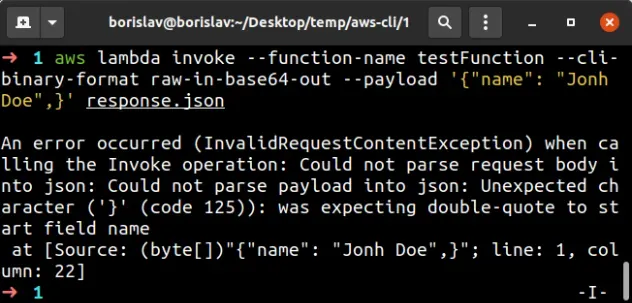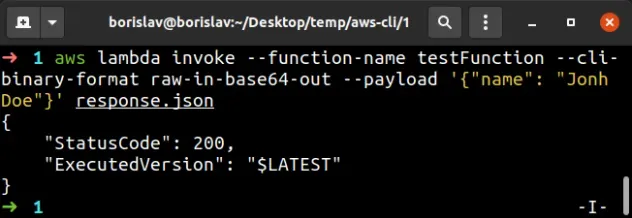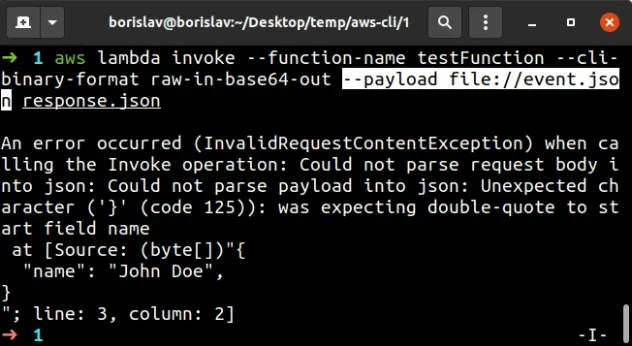Could not Parse Request body into JSON Error - AWS CLI
Last updated: Feb 26, 2024
Reading time·2 min

# Could not Parse Request body into JSON Error - AWS CLI
The "InvalidRequestContentException - Could not Parse Request body into JSON
Error" error occurs when invoking a Lambda function with syntactically incorrect
JSON payload, or forgetting to set the --cli-binary-format parameter to
raw-in-base64-out.
For example, the following command throws the error.
aws lambda invoke --function-name testFunction --cli-binary-format raw-in-base64-out --payload '{"name": "John Doe",}' response.json

The reason is the dangling comma in the --payload parameter.
Note that if you're on Windows, you should escape the double quotes in the
JSON string - '{\"name\": \"John Doe\"}'.
The fastest way to validate and correct your JSON is to use a JSON validator.
If you paste your payload into the form, the validator checks for errors and sometimes directly fixes them.
--payload parameter expects base64 encoded input by default. Therefore, when passing a raw JSON string, we have to set the --cli-binary-format parameter to raw-in-base64-out.Once I correct the JSON string and remove the dangling comma, the invoke
command runs successfully.
aws lambda invoke --function-name testFunction --cli-binary-format raw-in-base64-out --payload '{"name": "John Doe"}' response.json

Similarly, if we invoke the Lambda function with syntactically incorrect JSON stored in a file, we still get the "Could not parse request body into JSON" error.
aws lambda invoke --function-name testFunction --cli-binary-format raw-in-base64-out --payload file://event.json response.json

The contents of the file supplied to the --payload parameter can be any JSON
with syntax errors, i.e.:
{ 'name': 'John Doe' }
In this case enclosing the key and value in double, instead of single quotes solves the error.
{ "name": "John Doe" }
Once the supplied JSON is syntactically correct, the error is resolved.
# Further Reading
- How to Get your Default Profile with AWS CLI
- Manage Multiple Accounts with the AWS CLI
- Set your Default Profile's Name in AWS CLI
- How to Clear your AWS CLI Credentials
- View your AWS CLI logs in Real Time (tail)
- How to turn off the Pager in AWS CLI
- Create a Role with AWS CLI - Complete Guide
- Create a Lambda Function with AWS CLI - Complete Guide
- Invoke Lambda Functions with AWS CLI - Complete Guide
- Tag an S3 Bucket with AWS CLI
- AWS CDK Tutorial for Beginners - Step-by-Step Guide
- How to use Parameters in AWS CDK
- Could not Connect to the Endpoint Url in AWS CLI [Solved]

